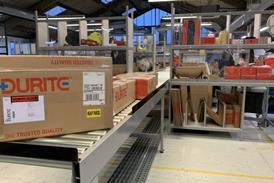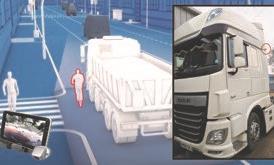Saul Resnick, chief executive of DHL Supply Chain UK and Ireland, discusses the company's latest financial results, its 'multi-faceted' approach to reducing emissions and why he's critical of fleet operators still reluctant to join the industry's journey to net zero
Q: What’s your strategy to cut emissions? And are many operators only paying lip service to zero carbon fleets?
A: We started 15 years ago so we’re ahead of the curve. But within the UK we realise we’re not going to be able to substitute 6,000 diesel vehicles for electric overnight. There’s not enough capacity, there’s not enough charging facilities and then there’s the cost.
So it’s a transition process using different fuels and different methodologies. HVO is a tool we’re using, because it allows us to use existing diesel vehicles and reduces your emissions by 80%. But we’re also investing in biofuels, both CNG and LNG vehicles. From a circularity point of view it’s a strong message. We’ve also recently bought our first electric trucks from Volvo.
Q: Are the government's net zero targets realistic?
A: A lot of things need to change. No operator can have trucks sat idle for hours on end. You need charging facilities. And ultimately hydrogen will come on board which will help. All of these things will happen but they won’t happen in isolation, it will be in conjunction, and that’s our approach. And likewise with warehousing we’ll do more with solar power and converting energy back to the grid to fuel our supply.
Q: Who’s going to pay for the transition? Roads minister Richard Holden has stressed the need for commercial partnerships, not government incentives. Where does that leave DHL?
A: There’s an opportunity for all parties to play a role. The government has an opportunity in creating an infrastructure which will future proof our country. Big commercial organisations have a role to play but it can’t all land on their shoulders.
In time I don’t believe it will be cost prohibitive for operators to switch to electric. Right now you have a scarcity of supply, but in time you won’t. And as with any economic model, supply and demand will match and costs will come down over a period of time. As things stand fuel is more expensive.
Q: And electric trucks are a lot more expensive…
A: Yes but we’re seeing that softening as well because more manufacturers are switching from traditional combustion to electric and others. We can’t expect to get there without some pain but hopefully if all parties work to the same objective we’ll get there a lot quicker. DHL may be the biggest player and we want to set the right example but we want to get there collectively.
Q: What do you make of HGV operators who say they’ll refresh their diesel fleets just before the 2035 phase-out date and run them for another generation? Will the government’s net zero targets have to be pushed back?
A: Each company will make their own commercial decisions. I suspect that might be quite short sighted because at what point do you devalue or reduce the capital value of these diesel assets? They’re not going to be worth what they were last year in 10 years’ time. Demand will eventually slide. Whether it’s in five or 10 years’ time, demand will reduce and continue to reduce for these vehicles. What you‘ll see then is the cost will depreciate quicker, there’ll be less residual value for them. I wouldn’t want to be the last person standing with a whole fleet of diesel trucks.
Q: Evri fleet boss David Landy told us operators may be forced into buying trucks they don’t want in the next buying round. Do you agree?
A: The narrative has to change. If people look at this as being compelled, it’s the wrong argument. The argument has to be that this is the right thing to do. Our customers - the multinationals, the large retailers - expect us to work with them. The younger generations are also demanding this kind of behaviour. They won’t tolerate heavy carbon emissions to be associated with their products. We can’t wait for the world to line up neatly. Sometimes you have to be leaders. DHL and other large organisations have to lead the way, not the SMEs, they can’t afford to.
Q: What’s your best guess on how the transition for HGV fleets will ultimately pan out?
A: Truth is I don’t know and that’s why we’re taking a multi-faceted approach. We’re working with HVO and with LNG and CNG which have benefits and limitations. Electric also absolutely has a part to play. Technology will get better, hydrogen fuel cells will come in and who knows what else. And that’s exciting because it creates big opportunities.
Q: Is the government taking the right approach? Operators see no action plan or incentives…
A: It’s a real challenge and clearly we would like the government to be supporting us more in terms of infrastructure. It’s also about getting power to those charging facilities.
Q: You increased turnover to £3.1bn last year with pre-tax profit increasing by 86.5% to £63.3m. How satisfied are you with those figures?
A: In a difficult market we continue to perform strongly. We're seeing top line growth, we’re seeing profitable growth. We’re happy with the results and want continue to grow and deliver high end profitability. In a tough and testing market we can be proud of what we’ve achieved.
We’re fortunate that we play in a number of sectors. We’re well represented in retail, consumer, airline services and healthcare. The diversity of our portfolio has helped. We’ve seen uplift in the airline travel space since Covid which has been a big boost. We’ve also seen more availability of microchips so an uplift in motor manufacturing.
But on the flip side the retail sector is really struggling. Higher inflation in the low teens in grocery is impacting spend. We’re clearly a massive part of that because we move all the product into these stores.
Healthcare is always relatively recession proof and consistent, so that business is stable. Consumer business in parts has slowed down but what we do on the forecourt has uplifted. Shoppers are buying products more frequently but there’s less volume. High interest rates are impacting people’s disposable income. Mortgage payments are higher and rentals are increasing. E-commerce has also come off a lot from the highs of Covid. So that will continue to be a challenge as will grocery prices until we see inflation pressure brought to a more normalised level.
Q: Any room for optimism over the economy?
A: Yes, there’s light at the end of the tunnel. Inflation rates are coming down, the reserve bank is pausing interest rate increases. So hopefully we’re at the top of that and in due course we’ll see a softening. That will also speed up development in the market.
Q: Where do you see the market in a year’s time?
A: I’m optimistic by nature. Things are never as bad or as good as you think they are. We’ve got a strong economy, we’ve got a strong business and we’re still seeing very low levels of unemployment. That all bodes well for a strong bounce back. All the indicators seem to suggest a bounce back, with lower interest rates, lower inflation, lower levels of unemployment and fuel prices set to drop. Hopefully that will lead to greater consumer confidence and spend and translate into positive growth, which we’ve seen slow down over the last 12 months.
Q: What would be your advice to SMEs struggling on thin margins?
A: It isn’t that different to what we’re doing ourselves. Stay true to your core business. The focus has to be on your customers. Make sure you do what the customer wants you to do, not what you think the customer wants you to do. We look after them in tough times as well as good times. Whether you’re an SME or a large operation that doesn’t change.
This isn’t the time to be lavishly expanding on your costs and head counts unnecessarily. Do the things that make the most benefit to the business short term and medium term as well as to your customers. Then when an opportunity comes to open the purse strings that’s what we’ll do accordingly, and that’s what SMEs should be doing too.
Q: How much growth are you seeing in the business?
A: It’s within the budgeted forecast numbers but not growing organically. Fortunately, we have access to capital and we’re making long-term investments on automation, technology etc. So we’re certainly not parking up trucks or standing down shifts, we’re full steam ahead. But clearly our customers aren’t all growing at the same rate. In some cases we’re at 110% growth, especially travel and automotive, but elsewhere it’s a lot lower.
Q: What are the big growth areas?
A: Our transport business really excites me enormously. What we’re doing in terms of bio fuels and bio gases, HVO, electric... All of these ahead-of-the curve investments enable us to position ourselves at the forefront of the industry. We’re leading the way in setting the right tone on what firms should be doing from an environmental and sustainability point of view, but we’re also giving our customers the opportunity to partner with us, perhaps even ahead of their own requirements. Because it’s not a case of if but when companies will be compelled, at some level, to convert diesel to more environmentally friendly fuel. It will be a growth sector for us in due course.
I’m also excited about what we’re doing in the e-commerce space where we’ve invested a lot in technology. Most companies have some form of omni presence now, not just B2B but B2C and we have some great solutions.
Our consumer space also continues to grow. We’ve invested in high density solutions, carbon neutral buildings etc. Those sectors are ripe for growth, as is healthcare which is another massive growth opportunity. We’re doing clinical trials of high grade facilities for the distribution of pharmaceuticals and biologicals.
Q: Where else is DHL focusing its attention?
A: A lot of it revolves around data and technology and how to better manage risks that impact supply chains. We also give customers advice on where they can near-source their facilities or insure them to give them a better risk managment strategy.
We're also using automation, not because we want to substitute labour but to complement the labour we have so our staff are better utilised. Finally we are fixated on looking after our people. But we have to balance wages against what’s affordable and doesn't compromise our position in the market.
Q: Will multimodal become a bigger trend?
A: There’s a lot of arguments for rail but you have to be able to be responsive to customer requirements and have a reliable solution. It has got to be about more than just the envirmoment. There's cost, access, reliabilty and speed of service. There’s a space for rail movement but it won't be the panacea for all transport movements. We could see greater use of rail from dock to DC.
Q: Any M&A activity in the pipeline?
A: If we see something that will add value yes. It's not scale we're after but if there's a niche service that adds specific value that we don’t have and can develop we’d be interested. But it’s hard to identify something where somebody in the world isn’t doing it already.
Q: You've been in the UK for 18 months now. What’s the best part of your job?
A: I truly enjoy walking our sites and talking to our people. The more time I can spend away from my computer and engage with people the better. I’m inspired by them and take a lot from it.
Overall it’s been a great transition. l loved working in Australia. I was there for 17 years and I’m loving working in the UK as well, weather not withstanding. I want to drive positive change and growth and create opportunities for my colleagues. If I can do that what's not to love about my job?
For more stories tracking the industry journey to decarbonisation see our new Freight Carbon Zero website.

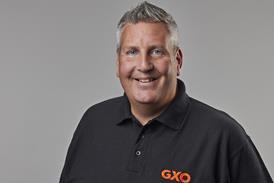
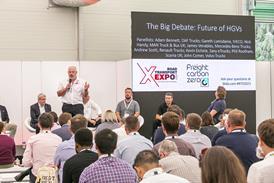
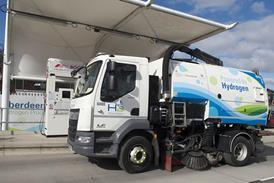


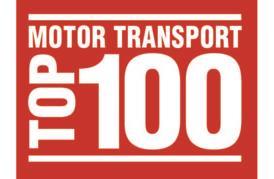


![Mercedes-Benz_eActros_600_(1)[1]](jpg/17820_mercedesbenz_eactros_600_11_978080.jpg)

